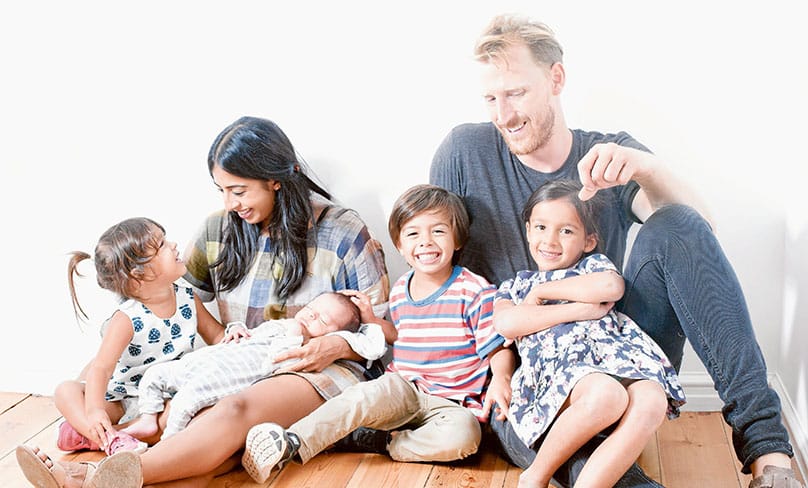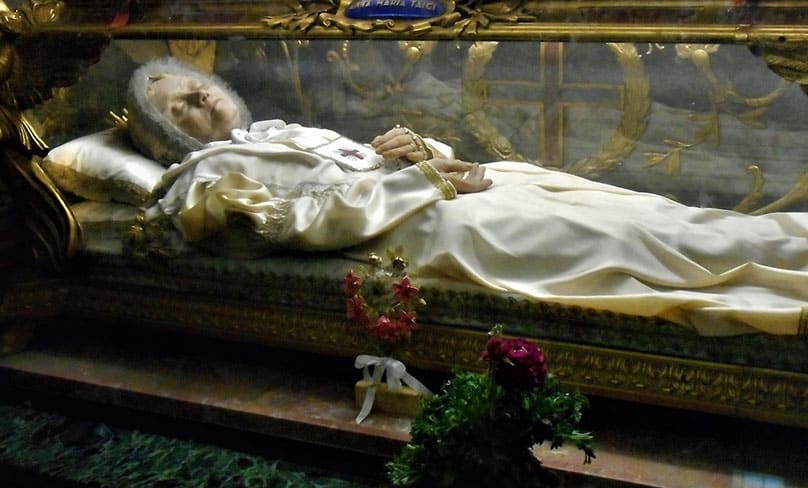
By Dr Joanna Howe
I have worn make up every day for 17 years. Never in a Kardashian way, mind you, but to hide my imperfections and accentuate my best features. My morning routine consists of Estee Lauder primer, Giorgio Armani luminous silk foundation, Benefit cheek tint, Rimmel eyeliner and mascara, finished with a nude lip balm from L’Occitane.
Each morning, as I wearily climb out of bed, usually far too early and abruptly awoken by my middle two children who are the earliest risers in our family of six, I know that an armour of make-up will mask my weariness to the world.
But this year when I prayed about entering into a radical Lent, I heard a faint whispering, ‘why not give up make-up?’ The thought came quickly and I immediately pushed it aside.
In other Lents, since coming into the Catholic faith at 21, I’ve given up sugar in my tea, taken up a daily rosary, sacrificed chocolate or wine.
In some years, usually during a spiritual dry period or when pregnant or breast-feeding, I’ve piked out of the whole Lenten-sacrifice thing altogether.
So it felt like quite a challenge to think about giving up make-up.
And not just make-up. As I kept praying about it in the days that followed the initial crazy thought, I wondered if I could give up my monthly shellac manicure and eyebrow wax?
Could I give up straightening my hair? The latter I ruled out as a bridge too far.
I thought ahead to my professional and social calendar for the 40 days of Lent. I wondered if I could just hide at home the whole time so that no-one would see my naked face. I realised quickly that would be impossible.
After all, a typical week includes the daily school run, a few days in at the office, daily Mass and a catch up with friends. I normally enter all of these with face made up and the thought of going bare was terrifying.
Make-up is a professional norm for women in my line of work. And like many women in all walks of life I draw confidence from the knowledge that whatever I’m feeling inside, my face feels fresh and looks presentable.

Hoping for some reassurance I turned to those closest to me. First, my sister. When I told her I was thinking of giving up make up for Lent, she replied straightaway. “You could never do that, you’re way too vain!”
I couldn’t disagree: ‘vanity’ has been a regular during my confessions, ever since I began frequenting the sacrament at 21.
Next, I tried my husband. Casually, and out of the blue, I told him I was thinking of giving up make-up for Lent and was pondering whether I should adorn my bare face with contact lenses or glasses.
“I think you should wear your glasses,” he said.
“Why?” I asked, somewhat mystified as I knew he usually preferred my contacts. He deadpanned, “Because glasses cover more of your face.”
Even after almost a decade of marriage, James never tires of stirring me to get a rise.
But still I wondered: without make-up to cover my face, did I (maybe) need glasses to cover my horrid undereye circles and other myriad blemishes?
My resolve to go make-up free for Lent began to waver, but as I continued to pray, into my mind popped a story I remembered reading last year of Blessed Anna Maria Taigi.
Born in 17th Century Italy, Anna Maria was incredibly beautiful and the constant affirmation of this from others led to her becoming incredibly vain. When she was in her late teens, something happened that made Anna Maria wary of attracting male attention through her looks, and it made her desire chastity.
Unfortunately, we don’t know what the incident was. But her biographer writes that Anna Maria quickly resolved to ‘shelter her virtue by giving it the safeguard of a chaste marriage’. She did so rashly, after just six weeks of knowing her suitor.

Anna Maria’s marriage was far from a fairy tale. Her husband Domenico was difficult. He was moody, exacting, impatient and had a brutish (but not violent) temper.
Although Domenico tried Anna Maria’s patience severely, she was glad to have married him. She felt called to a life of sacrifice and chose to give up jewellery and fine clothing, committing to the plainest of dress.
I remember when I first encountered this story of Anna Maria’s life I was struck that her marriage to Domenico was described as a lengthy spiritual martyrdom.
Although this could not be more different to my marriage to James, who is genuinely my best friend in the world, I could not help but be inspired by Anna Maria’s desire to find ways to embrace sacrifice within the confines of the vocation of marriage.
Nor were Anna Maria’s many sacrifices in vain. Early on in her marriage she was granted an extraordinary favour by God – to see a vision of a disc like the sun for the remainder of her life.
This perpetual vision was accompanied by the ability to see the future and to read hearts. There are many accounts of her doing this in her lifetime with startlingly accuracy and insight.
I would waft away in a holy cloud if I received such a spiritual privilege but not Anna Maria. She lived an ordinary life in an extraordinary way, remaining a diligent wife and mother who in 12 years, bore seven children, three of whom died in infancy.
Although extremely humble and adorned by the simplest of clothing, Anna Maria had substantial influence. She was consulted by many great men and women of the Church including two popes, a cardinal, one saint and even Napoleon’s mother!

According to one account, Anna Maria “always knew where her first duties lay,” as a mother and wife.
After her death, Domenico noted, “Sometimes, on coming home to change my clothes, I found the house full of people. Instantly my wife left everybody, lords and prelates, and hurried to receive me, to brush me down and to wait on me, with the greatest charm for me and the greatest satisfaction to herself. You could see that what she did, she did with all her heart – down to settling my shoe laces.”
The feminist in me is greatly irked by Domenico’s sense of entitlement and Anna Maria’s servitude. But at the same time I’m deeply intrigued by her love which ultimately led to her husband’s conversion and change of character and produced in her enough spiritual growth to lead to her beatification.
Inspired by Anna Maria’s example, I have decided that this Lent I will fast from make-up in order to unite myself to Jesus, who out of his own perfect, sacrificial and servant love saved the world.
It’s a small sacrifice in the scheme of things, but it feels quite terrifying to me. Still, who knows? Giving up make-up might improve my skin.
Dr Joanna Howe is an Associate Professor of Law, author and co-editor of three books and a former NSW Rhodes Scholar. She is on the Board of Youth Mission Team Australia. She lives in Adelaide with her husband James and their four children, Laura, Jesse, Paige and Ned.
